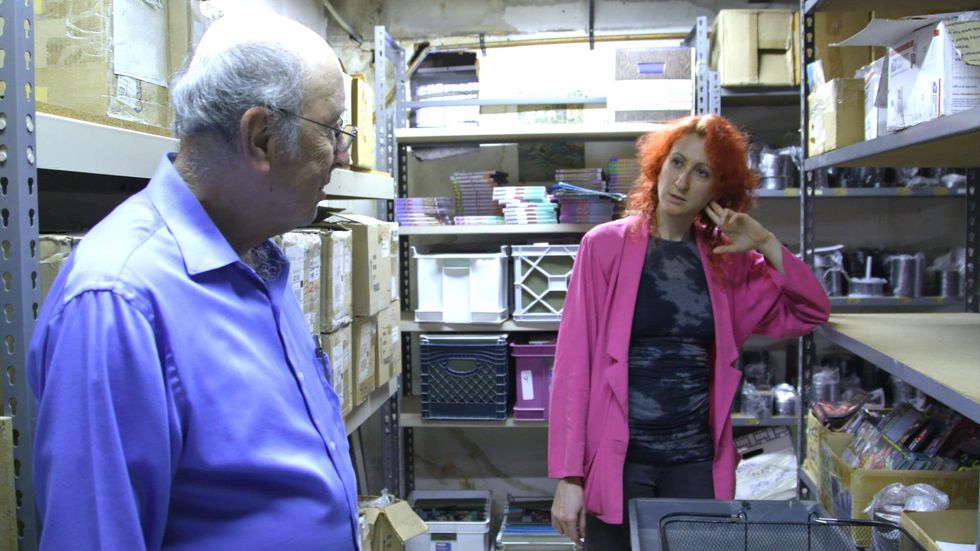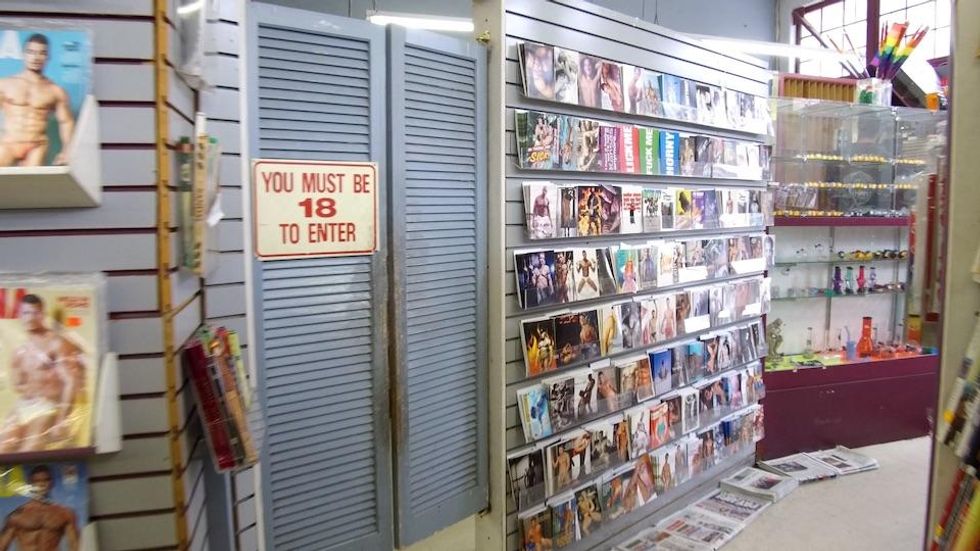Piles of old DVDs and books lie stacked in the back room of Circus of Books, the long-running adult bookstore in West Hollywood that closed last year. As the camera pans around, viewers catch a glimpse of half-naked men, gay porn stars of decades past, tiny stacks of cock rings, and miscellaneous sex toys still in their packaging.
Karen Mason and her husband, Barry, co-owners of the store, rummage through materials as their daughter Rachel films. "These [movies] paid for your college," she quips.
Indeed they did. After all, Karen and Barry ran the iconic Circus of Books for nearly 40 years, during which it became an LGBTQ institution with two locations, in West Hollywood and the Silver Lake neighborhood of Los Angeles (the latter closed in 2016). At its peak, the business was one of the largest gay porn distributors in America, and earned a special place in LGBTQ history (the alley behind the WeHo store, dubbed "Vaseline Alley," became one of the city's best-known cruising spots).
However, Karen and Barry kept what they did secret from their synagogue, friends, and family.
Their story is the subject of the new Netflix film Circus of Books, Rachel Mason's debut documentary. Executive-produced by Ryan Murphy, the doc chronicles the evolution of the business against the backdrop of social oppression, the HIV epidemic, marriage equality, and battles against censorship.
At one time, censorship wars were inescapable in LGBTQ publishing. In the early 1980s, the Masons were making decent money as one of Larry Flynt's top person-to-person distributors, taking orders from liquor stores and newsstands across the city for his titles.
The West Hollywood store, which was called Book Circus at the time, was one of their regular clients and ordered nearly 600 titles from the Masons, according to a 2019 story from the Los Angeles Times.
When Karen and Barry learned that the store's owner had run into financial trouble, they struck a deal with the man to pay half of his monthly rent until he was evicted. Eventually, they took over the lease and renamed the store Circus of Books.
Their discipline as small-business owners quickly turned it around. They kept the staff, and along with pornography, they sold obscure novels from queer authors as well as those reflecting other niche interests that were hard to find at the time.
"It was very eclectic and [welcomed] people with great artistic taste and literary tastes," Karen says. "We sold a lot of diverse styles, a lot of unusual pieces people couldn't find anywhere else -- foreign magazines, porn magazines, fashion magazines, art magazines."
With three children to raise, Karen and Barry immersed themselves in the business, never truly grasping the importance of what they were doing until years later.
"When the store was closing, people were coming in, day after day, just to say goodbye, to say how much it meant to them," Karen says. "Any number of people said that they probably wouldn't be here, people who were close to our age, if it wasn't for the store."
For the Masons, however, it was business as usual. "We were just running a business," Karen says. "There were payrolls to be met, insurance bills to be paid, toilets to clean -- a small business is about a lot of detail."
Barry Mason with his filmmaker daughter, Rachel
Business was booming in the '80s, and the Masons opened a second location in Silver Lake -- not far from the Black Cat Tavern, a queer bar that was raided by police in 1967. The event spawned pre-Stonewall demonstrations, the first in the queer liberation movement, and ultimately led to the opening of Book Circus as a response. Also, The Advocate started as a local publication in response to the Black Cat raid.
"When we got the bookstore, one of the best-selling newspapers we had was The Advocate," Karen remembers. "In fact, it always sold so well that we always had the previous edition in addition to the new edition. It was one of the few publications where there was always a back issue."
In the early 1980s, West Hollywood wasn't giving a bookstore that had adult material too many problems. (The city itself wasn't incorporated until 1984; until then it was an unincorporated area of Los Angeles County.)
"When we got it, we were trying to follow the rules for how we got a permit to be an adult bookstore and we couldn't figure them out," Karen recalls. "Finally, our lawyer at the time, David Brown, said to us, 'Just open the store and if they sue you, I'll defend you.' And with those two sentences, I forget how many thousands of dollars we paid him, it was the best legal retainer we ever spent because we never had any trouble."
The business's success created opportunities for local LGBTQ entrepreneurs and buyers to supply it with merchandise.
"We had several buyers who bought specific merchandise," Barry says of those years, "and most of the buyers would happen to be gay. We didn't go out looking for gay buyers. They just were people that were in the store, and at some point an opportunity came and they had the aptitude and knew what the store could sell. So whatever they bought for the gay audience came from our gay buyers and magazine buyers."
"We had a guy in the '80s who just bought condoms," Karen remembers. "He was really careful about what he bought because it was important to save lives. He was very careful about what we carried."
A peek inside Circus of Books, courtesy Netflix
One piece in the film, beautifully curated by Rachel and her video editor Kathryn Robson, is the coming-out story of her younger brother Josh. Despite what the Masons did for a living, Karen's commitment to her Jewish faith created a traumatic experience for her and the family.
"It's not a period I'm particularly proud of," explains Karen, who is now a staunch LGBTQ activist and PFLAG organizer. "I really had to rethink a lot of things because it upset me a great deal. And the way I came to the understanding was really through the support circles that occur in peace-like meetings when [PFLAG] groups gather, and people just talk about what it means to be gay, what it means to have gay children."
She adds, "If you're from, say, a religious background like mine, or almost any religion, [religious leaders are] not very good even now with homosexuality, although they're all trying to get better. But at the time, PFLAG was a place to have a really open, frank, and understanding discussion."
Rachel, a renowned visual artist, took exceptional care in displaying the cultural evolution happening at the peak of the store's success. Particularly, she says the movie aims to highlight the courage and heroism queer people in the 1970s exhibited during a time when you could run afoul of the law for being gay.
"I think the younger generation can't really understand what it was like for [queer people] and why the store meant so much to them," Rachel explains, adding that she also wanted to shine a light on the adult entertainment industry.
"I feel very strongly that people in the adult entertainment industry are judged, and I think this film should shed light on the fact that the people who work in this field are just regular people," she adds. "This is a legal enterprise, and our government has no right to get involved and say you can't do this."
"People in the industry pay taxes," she says. "It's a legal industry. It's one of the most widely consumed commodities there is, so for people to act like they're not consuming [porn] is actually very hypocritical."
As an artist who pushes creative boundaries herself, Rachel understands the unjustness behind the censorship wars that nearly sent her father to prison.
In the '80s, Circus of Books was caught in an FBI sting as the Reagan administration cracked down on pornography. Barry was convicted on a porn charge, but Bill Clinton would later forgive it.
"People don't know how the government has been," Rachel explains. "It's disgusting the way the government has treated these people and the businesses, and there are many more like my parents, people who actually went to jail for doing such minor, stupid things like shipping a videotape or magazine."
She adds, "When you think of real crimes that we can be focusing on, this is where our tax dollars are going? I was very happy to highlight that because this is the pointlessness of certain administrations when they get on a moral crusade. Ironically, they are not at all about family values. They tear apart families when you take someone to jail for five years for selling a magazine. That's insane. Those people have families too."
As the internet birthed e-commerce, bookstores across the country suffered. Circus of Books was no exception. As the digital revolution gained momentum -- spawning apps like Grindr and Scruff -- LGBTQ folks resorted to apps for cruising rather than traveling to their city's known cruising spots.
Karen, who worked as a journalist before taking over the business, still has hope for print journalism.
"I would love to see that kind of journalism flourish, but I haven't seen any model that is really making it profitable," she says. "It was always supported by advertising, so [publishers] have to figure out a way to get advertising back or get people to pay more money for subscriptions."
Circus of Books is currently streaming on Netflix.

















